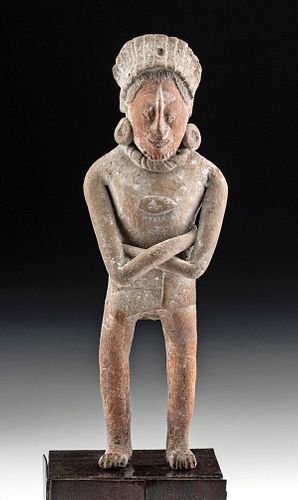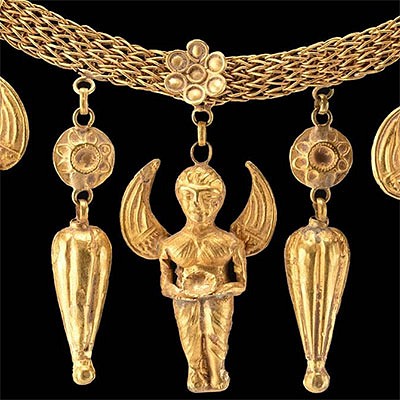Maya Jaina Pottery Standing Warrior Figure w/ TL
Lot 91
About Seller
Artemis Gallery
686 S Taylor Ave, Ste 106
Louisville, CO 80027
United States
Selling antiquities, ancient and ethnographic art online since 1993, Artemis Gallery specializes in Classical Antiquities (Egyptian, Greek, Roman, Near Eastern), Asian, Pre-Columbian, African / Tribal / Oceanographic art. Our extensive inventory includes pottery, stone, metal, wood, glass and textil...Read more
Estimate:
$8,000 - $12,000
Absentee vs Live bid
Two ways to bid:
- Leave a max absentee bid and the platform will bid on your behalf up to your maximum bid during the live auction.
- Bid live during the auction and your bids will be submitted real-time to the auctioneer.
Bid Increments
| Price | Bid Increment |
|---|---|
| $0 | $25 |
| $300 | $50 |
| $1,000 | $100 |
| $2,000 | $250 |
| $5,000 | $500 |
| $10,000 | $1,000 |
| $20,000 | $2,500 |
| $50,000 | $5,000 |
| $100,000 | $10,000 |
| $200,000 | $20,000 |
About Auction
By Artemis Gallery
Dec 3, 2020
Set Reminder
2020-12-03 10:00:00
2020-12-03 10:00:00
America/New_York
Bidsquare
Bidsquare : Fine Antiquities, Ethnographic & Fine Art
https://www.bidsquare.com/auctions/artemis-gallery/fine-antiquities-ethnographic-fine-art-6119
Features classical antiquities, ancient and ethnographic art from cultures encompassing the globe. Egyptian, Greek, Roman, Etruscan, Near Eastern, Asian, Pre-Columbian, Native American, African / Tribal, Oceanic, Spanish Colonial, Russian, Fine Art, so much more! All legally acquired, legal to sell. Artemis Gallery info@artemisgallery.com
Features classical antiquities, ancient and ethnographic art from cultures encompassing the globe. Egyptian, Greek, Roman, Etruscan, Near Eastern, Asian, Pre-Columbian, Native American, African / Tribal, Oceanic, Spanish Colonial, Russian, Fine Art, so much more! All legally acquired, legal to sell. Artemis Gallery info@artemisgallery.com
- Lot Description
Pre-Columbian, Gulf Coast of Mexico, Western Yucatan Peninsula, Jaina/Campeche, Maya, Late Classic Period, ca. 550 to 850 CE. A stunning example of a hand-built pottery warrior with finely preserved detailing across the composition. Standing atop delineated legs, the proud warrior presents with bare feet exposing incised toes and wears a padded band around his waist while crossing both arms atop his abdomen. An ovoid medallion is centered on his chest beneath sloped shoulders that flank a thick, twisted necklace and discoid earspools indicative of high-status fighters. The characteristic Jaina-style countenance bears slanted, almond-shaped eyes, a petite mouth bearing two rows of teeth beneath an incredibly tall nose, and finely incised bangs beneath a scalloped headdress with a central perforation. The legs, face, and back are elegantly decorated with red-orange powder pigment that stands out against the tan-hued ground, and faint remains of white pigment are visible across the figure as well. A superb example of Jaina figural artistry! Size: 1.9" W x 5.875" H (4.8 cm x 14.9 cm); 7.125" H (18.1 cm) on included custom stand.
Jaina figures, from an island off the Yucatan peninsula, are noted for their lifelike faces and their immense attention to detail. Scholars believe that sculptors modeled these figures' clothing on real clothing worn by the elite during the Late Classic Maya period. These figures likely represented actual people, were produced in Campeche, and then were brought to Jaina Island to be buried with the deceased. Fascinatingly, the people around Jaina are the only people in southeastern Mesoamerica who put human figures into graves. Everywhere else in the region, figures have been found solely in domestic contexts. The Spaniard Diego de Landa, who recorded details of Maya life shortly after the Spanish Conquest, wrote that the artists who created pieces like this one lived lives of religious isolation and ritual - fasting and abstaining.
This piece has been tested using thermoluminescence (TL) analysis and has been found to be ancient and of the period stated. A full report will accompany purchase.
Provenance: ex-Millea Bros, Ltd., Boonton, New Jersey, USA; ex-estate collection of Nancy R. and Myron L. Mayer, New York, New York, USA, acquired in March 1964; ex-Mathias Komor Gallery, New York, New York, USA, inventory no. M 211
All items legal to buy/sell under U.S. Statute covering cultural patrimony Code 2600, CHAPTER 14, and are guaranteed to be as described or your money back.
A Certificate of Authenticity will accompany all winning bids.
We ship worldwide and handle all shipping in-house for your convenience.
#156597Repairs to both legs and rim of opening behind right arm, with resurfacing and overpainting along break lines. Minor nicks to body and head, with fading to original pigment, and light encrustations. Great remains of pigment and nice earthen deposits throughout. Old Komor inventory label on verso. Two TL drill holes: one behind head, and one underneath left shoulder in armpit.Condition
- Shipping Info
-
All shipping is handled in-house for your convenience. Your invoice from Artemis Gallery will include shipping calculation instructions. If in doubt, please inquire BEFORE bidding for estimated shipping costs for individual items.
-
- Buyer's Premium



 EUR
EUR CAD
CAD AUD
AUD GBP
GBP MXN
MXN HKD
HKD CNY
CNY MYR
MYR SEK
SEK SGD
SGD CHF
CHF THB
THB














